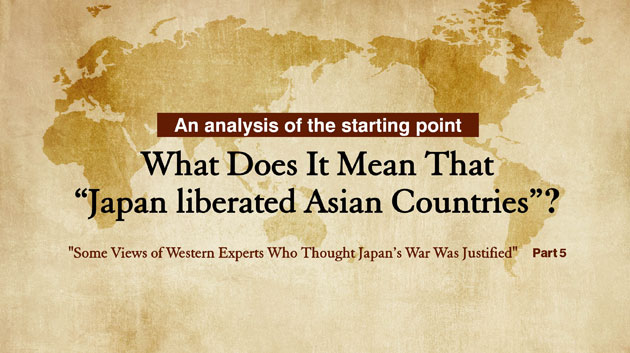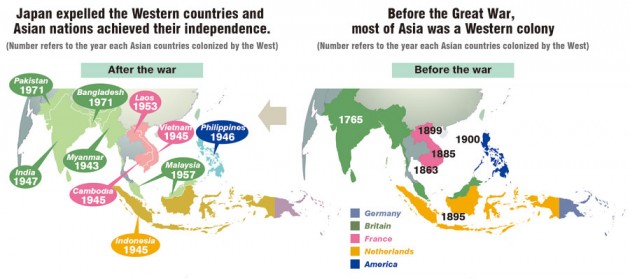An analysis of the starting point What Does It Mean That “Japan liberated Asian Countries”?
Up until the Second World War, the world was ruled by imperialism where Western powers invaded Asia and Africa, and took various things. Most Asian countries were colonized, controlled by the white ruling-class (see below pic). It was Japan that paved the way for Asian countries to liberate themselves from colonial rule and move towards independence.
Japan Admired By Asia
In 1941, Japan fought against the British navy in what was then part of the U.K. in the coast off of the Malay Peninsula, and had sunk the “Prince of Wales,” which was at the time said to be unsinkable. British forces were subsequently expelled from Malaysia and Singapore, and anti-British movements sprung up not only in Asia but in Middle Eastern nations such as Iraq, which was a British protected state at the time.
The Battle of Imphal where the Japanese army and the Indian National Army fought together for the independence of India is especially well known in the annals of Asian liberation. Captain Yadava, formerly of the Indian National Army, had in
1998 expressed gratitude to the former Japanese soldiers in the following statement.
“The soldiers of the Indian National Army express the deepest respect to the soldiers of the Japanese Imperial Army who fought alongside us as brothers at the Imphal and Kohima battlegrounds to liberate India. The citizens of India will never forget those brave Japanese soldiers who gave their lives to a great cause.” (Kazuhiko Inoue “We Thank Japan for Fighting”)
Japan also expelled Western powers from places such as Indonesia, Philippines, and Burma (Myanmar), paving the way for independence of those Asian countries. Thus, even as Japan had lost the war, they continue to be praised and admired.
For instance, the Philippines built a “Kamikaze Museum” to honor the Kamikaze attack corp’s spirit of defending the country. In Indonesia’s declaration of independence, the Japanese Imperial calendar is used instead of the Western calendar. Japan had advanced human equality in World War II, fighting with their lives, and realized a great cause that was the liberation of Asia.
Tokyo Trial Itself Was Unjust
However, Japan was judged as an “aggressor nation,” at the Tokyo Trial.
The Tokyo Trial was not founded on international law in the first place. The Japanese counsel, Ichiro Kiyose, asked for the legal basis of the trial, but Judge Webb could not provide an answer to the very end.
In fact, all of the judges were from the victor nations. Even the American lawyers protested that, “there must be judges from neutral countries. Guilt cannot be claimed for conducting war that is legal under international law.”
Especially the American lawyer Blakeney stated in effect, “who shall pay for the brutality of the atomic bomb?” In the end, the two hundred thousand lives wiped out by the two atomic bombs as well as the one hundred thousand lives killed through the indiscriminate bombing during the Tokyo Air Raid were never addressed.
Class A War Criminal Without Evidence
The sole international law scholar, India’s Justice Pal, consistently stated Japan’s innocence during the trial. Pal is also well known for questioning the setup legitimacy of the Tokyo Trial itself, and submitting the “Pal Judgment Document” in which he denied the individual responsibility of the Japanese side.
Most of the evidence used at the trial were from the Allies, and material and statements submitted by Japan were simply ignored. Still, the “conspiracy” that the “leaders of Japan had conspired to initiate a war of aggression since 1928”, which was the central theme of the trial, could not be proven. In fact, the “Tanaka Memorial,” in which Japanese world domination is recorded was dismissed as evidence.
Despite this, 25 individuals were judged as class A war criminals, and 7 including Hideki Tojo were executed.
Later at the San Francisco Peace Treaty, the release of class A criminals who had been sentenced to life imprisonment was approved, and the Japanese government went ahead with parliamentary procedures to release them all and restore their honor. That is, there are no more war criminals left in Japan.
Those Who Spread a Masochistic View of History
In post-war Japan, over 206,000 people lost their jobs due to the GHQ ordinance of expelling public officials. As a result, communists and those from the left-wing intelligentsia entered the educational field and the mass media, where they have spread a “masochistic view of history” saying that “Japan was a rogue nation.” Even today, they continue to belittle Japan within the international community by spreading falsehoods like about the comfort women and the Nanking massacre.
The Japanese must shed itself of the false narrative that comes with this masochistic view of history, and tell the world the truth about the war.




















